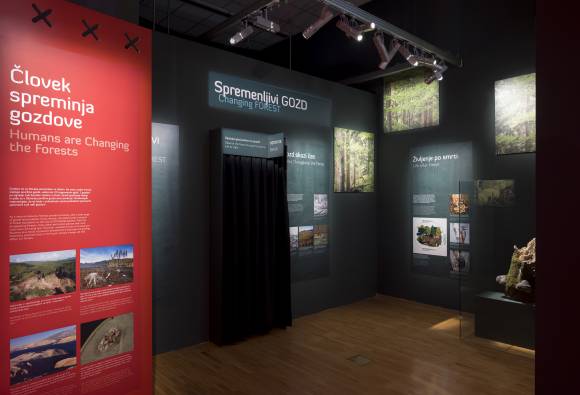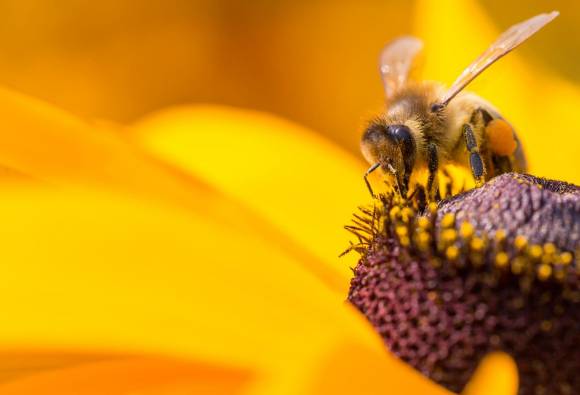
World Bee Day
Celebrating the 6th World Bee Day and the 12th Year of Urban Beekeeping at Cankarjev dom
As a pioneer of urban beekeeping in Slovenia, Cankarjev dom joins in the celebrations of the 6th World Bee Day (20 May), whose main purpose is to raise awareness of the importance of bees and other pollinators for humanity, food security, elimination of global hunger, environmental protection and biodiversity. Bees are pollinators of most plants and an important link to the natural balance and existence of life on Earth.
Urban beekeeping at Cankarjev dom was launched on 1 April 2011 when so-called stacking beehives were first installed on one of our cultural centre’s roof terraces on the initiative of Cankarjev dom’s employee Franc Petrovčič, a recipient of the Anton Janša Decoration (III and II Order). The quality of the honey made by bees on Cankarjev dom’s roof for over a decade is assessed and validated by a reference laboratory in Bremen where the honey is sent for an annual analysis. Cankarjev dom holds the Slovenian Beekeepers’ Association Certificate of Entry into the Register of Producers of Slovenian Honey with a Protected Designation of Origin.
The annual honey harvest at CD depends on the number of bee families and the weather conditions when the flowers are in full bloom. Nevertheless, CD tends to produce 20 kilograms of honey per bee family each year. This spring, six families of Carniolan bees are buzzing in their beehives on our roof. While this year’s unpredictable spring weather, from severe heat to prolonged rain and lower temperatures, has impacted the development and yield of bee families, climate change has been radically affecting the development of bee families over a period of several years.
Cankarjev dom’s Programme on 6th World Bee Day
At 12.00 and 16.00
Guided Tours of Beehives on the Roof of Cankarjev dom
Conducted by Franci Petrovčič, CD beekeeper
Meeting point CD reception desk, entrance from Prešernova Street
Applications: zvezdana.lazar@cd-cc.si
Bees have been coexisting with culture on the roof of Cankarjev dom for twelve years, making CD one of the first urban beekeepers in Slovenia. Cankarjev dom's honey is of high quality and has been certified as Slovenian honey with a protected geographical indication.
Cankarjev dom is a member of Ljubljana’s Bee Path, a project launched in 2015 and run by the Municipality of Ljubljana.
At 19.00
Good Night, Children
Live storytelling from the Čebelica collection
AV broadcast
Directed by: Klemen Markovčič
In cooperation with the Municipality of Ljubljana and RTV Slovenia Children's Educational and Documentary Programme
The roof of Cankarjev dom, next to the beehives
Applications: zvezdana.lazar@cd-cc.si
At 20.00
A Bee’s Diary
Tagebuch einer Biene
By: Dennis Wells
Germany, 2021, 92 min
The documentary, filmed over a space of three years, sets out to capture the intimate life of a winter and summer bee. The adventurous journey of a single bee is shown, from its birth to the founding of a new bee colony. The latest camera technology and special post-production process allow for a unique visual language that provides spectacular insights into the world of bees. We learn that bee colonies are not as homogeneous as we think. They are full of different individuals with very different tasks, abilities and even preferences. The film is suitable for both young and adult audiences, bee lovers and researchers alike.
“While working on a film about wild bees, I learned from Bee Scientist Tugrul Giray, from the University of Puerto Rico, that bees can dream when they sleep. I wasn’t even aware that bees slept (supposedly, even snored), let alone dreamed. I asked him how he knew that. Giray explained that bees have a dream state because, apart from flying, the only other time that they move their antennae in a distinct and unique way is when they sleep. That was why he theorized that bees have a dream state. Like dogs twitching their paws or howling in their sleep. Of course, no one knows what they're dreaming about.” (Dennis Wells)
Kosovel Hall, EUR 4
Educating the young is one of Cankarjev dom’s prime focuses. Cankarjev dom is committed not only to presenting a first-rate arts and education programme, but also raising awareness about the importance of living in harmony with nature, preserving the environment and nature, sustainable development and mitigating adverse environmental impacts. Cankarjev dom fulfils this educational mission by organising environmental exhibitions and other events. Dedicated to one of the key issues of our time is the natural history exhibition In the Vortex of Change organised in cooperation with the Slovenian Museum of Natural History and on view at the CD Gallery until early November.
Urbani Čebelar Society and Ljubljana’s Bee Path
Cankarjev dom is a co-initiator of Urbani Čebelar (Urban Beekeeper), a society dedicated to raising awareness about bees, fostering apiculture and responsible urban beekeeping. Cankarjev dom is also a member of Ljubljana’s Bee Path, a project launched in 2015 by the Municipality of Ljubljana. The Path is managed by the City of Ljubljana through various activities (postponing mowing, and planting aromatic plants and herbs and native honey plants and trees) and the active involvement of its members. It is dedicated to the well-being of urban bees and raising awareness about the importance of bees in our ecosystem.
About the World Bee Day
In December 2017, the UN General Assembly accepted Slovenia’s proposal and declared 20 May as World Bee Day.
In 2014, the President of the Beekeeping Association of Slovenia, Boštjan Noč, proposed that the United Nations proclaim 20 May as World Bee Day.
On 20 December 2017, following three years of international efforts, the UN Member States unanimously approved Slovenia’s proposal and 20 May was proclaimed World Bee Day. In 2015, the initiative was unanimously supported in South Korea by the world beekeeping organisation Apimondia (International Federation of Beekeepers' Associations).
20 May is also the birthday of Anton Janša (1734–73), the most outstanding figure of Slovenian beekeeping and the pioneer of modern beekeeping. Anton Janša was the first beekeeping teacher at the Viennese imperial court of the Habsburg Empress Maria Theresa. In the 18th century, he completely revised the theretofore beekeeping methods based on his findings and laid the foundations of modern beekeeping. He gained renown for his work already during his lifetime. After 1775, all national beekeeping teachers had to employ his teaching methods.
Population of Bees and Other Pollinators Declining Drastically
Scientific studies conducted by the United Nations and the International Union for the Conservation of Nature have shown that there are more and more negative effects on the health of bees, which makes them increasingly endangered. This, in turn, requires us to take extra care of their survival, as harmful factors cause a decline in the resistance of bees, which affects their susceptibility to diseases, pests and the like. Bees are continually exposed to new diseases and pests, and their natural habitat has been shrinking due to the growing human population. Furthermore, the survival and development of bees and other pollinators are also increasingly affected by climate change. Bees need clean air, water and a clean environment.
Slovenia at the Top of the World in Number of Beekeepers per Capita
With five beekeepers per 1000 inhabitants, Slovenia ranks at the very top of the EU Member States in terms of the number of beekeepers per capita. Slovenians are a nation of beekeepers, and beekeeping enjoys a status equal to that of other types of agricultural practices. In Slovenia, awareness of the significance of bees and ensuring their well-being is therefore generally high. For tens of thousands of Slovenians, beekeeping is a way of life with a long tradition, and the bee, especially the autochthonous Carniolan bee, is part of the Slovenian national identity. As many as three percent of all Slovenian beekeepers, with more than 4500 hives, are located in the area of the City Municipality of Ljubljana. Slovenia is the first EU Member State that provided legal protection to bees. In 2011, Slovenia was one of the first countries in the EU to prohibit the use of certain pesticides most harmful to bees.
Bees play an important role in nature, ensuring the existence of humanity. Slovenians are well aware of their exceptional mission, which is why beekeeping is so strongly grounded in our tradition.
Cankarjev dom’s Sustainable Goals
Keenly aware of the importance of sustainable cities and communities, Cankarjev dom grows honey plants, keeps bees on its roof, and manages the green areas of the Council of Europe Park that boasts 230-year-old trees. This spring, together with Zavarovalnica Triglav, Cankarjev dom made a video oriented towards the UN and the #Zavarujmo prihodnost Community Goal 11 – Make cities inclusive, safe, resilient and sustainable.
What do bees have in common with a world without hunger, one of the 17 Sustainable Development Goals? A lot, actually. As pollinators of three-quarters of the world’s crops, bees have several characteristics in common with the 2030 Agenda for Sustainable Development, which envisions a world free of hunger and an end to environmental degradation. The contribution of bee pollination in promoting sustainable development goals through food security and biodiversity is widely acknowledged.


Bodite med prvimi ...
.... ki boste izvedeli, katere koncerte, predavanja, gledališka in plesna gostovanja in drugo pripravljamo v Cankarjevem domu,


